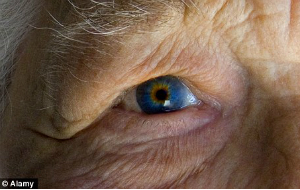 Older people taking aspirin have double the risk of an eye disease that can cause blindness, say researchers.
Older people taking aspirin have double the risk of an eye disease that can cause blindness, say researchers.
A new study found a link between regular use of aspirin and age-related macular degeneration (AMD) - the most common cause of sight loss in people over 50.
The link could not be explained by a history of heart disease or smoking, which are both risk factors for the disease.
Millions of heart patients take daily low-dose aspirin on doctor’s orders to ward off a second heart attack or stroke, while others who have not been diagnosed with cardiovascular disease take it as ‘health insurance’.
Recent findings also suggest regular low dose aspirin cuts the risk of dying from a range of common cancers.
Researchers from Australia said there was ‘insufficient evidence’ to advise patients against taking aspirin, although some should be advised of the potential hazard if they already had AMD in one eye.
The wet form of the condition, caused by leaking blood vessels in the eyes, leads to vision loss in the centre of the eye’s field of vision. The dry form is more common and less severe, although people still suffer visual impairment.
Around 200,000 Britons each year suffer AMD and there is no preventative treatment, although laser surgery and drugs can limit damage caused by the disease.
The new study compared rates of wet AMD among more than 2,000 regular and non-regular users of aspirin over a period of 15 years.
Regular use was defined as taking aspirin once or more per week, says a report in the US journal JAMA Internal Medicine.
Among non-regular users, rates of wet AMD rose from 0.8 per cent at five years to 1.6 per cent at 10 years and 3.7 per cent at 15 years.
Corresponding rates for regular aspirin users were 1.9 per cent, 7 per cent, and 9.3 per cent.
It found that aspirin users -- regardless of their heart health or smoking history -- were at greater risk of the more serious type of vision loss.
Dr Gerald Liew, from the University of Sydney in Australia, who led the study, said: ‘Currently, there is insufficient evidence to recommend changing clinical practice, except perhaps in patients with strong risk factors for neovascular AMD.. in whom it may be appropriate to raise the potentially small risk of incident neovascular AMD with long-term aspirin therapy.’
Any decision on whether to stop aspirin treatment was complex and should be done on an individual basis, said the researchers.
US experts Dr Sanjay Kaul and Dr George Diamond, from Cedars-Sinai Medical Center in Los Angeles, said in a comment that more research was needed before patients could be advised to change the status quo.
‘From a purely science-of-medicine perspective, the strength of the evidence is not sufficiently robust to be clinically directive’ they said.
Previous research has also suggested a link between AMD and regular aspirin use.
Professor Yit Yang, of the Royal College of Ophthalmologists, said 'This tells us that patients who developed wet macular degeneration were more likely to have been put on aspirin for other health reasons.
'Those patients who were on aspirin and those who were not on aspirin may be different in other ways and may differ in terms of other risks of wet macular degeneration such as blood pressure or cardiovascular health or even family history.
'It is different from saying that aspirin actually causes the development of wet macular degeneration. However it is a small signal that there could be a direct causative link but it is not possible to confirm this at present.
'It is important not to ignore these signals of potential harm or side effects that medicines can cause but at present there is not enough evidence from these studies to justify recommending to patients that they should discontinue aspirin therapy.'
 Dzobak Volodymyr
РОЗДУМИ ПРО НАДВАЖЛИВЕ або ЧОМУ НАШІ ОЛІГАРХИ СТАЛИ МОГИЛЬЩИКАМИ НИНІШНЬОЇ УКРАЇНИ
Dzobak Volodymyr
РОЗДУМИ ПРО НАДВАЖЛИВЕ або ЧОМУ НАШІ ОЛІГАРХИ СТАЛИ МОГИЛЬЩИКАМИ НИНІШНЬОЇ УКРАЇНИ




 Older people taking aspirin have double the risk of an eye disease that can cause blindness, say researchers.
Older people taking aspirin have double the risk of an eye disease that can cause blindness, say researchers.